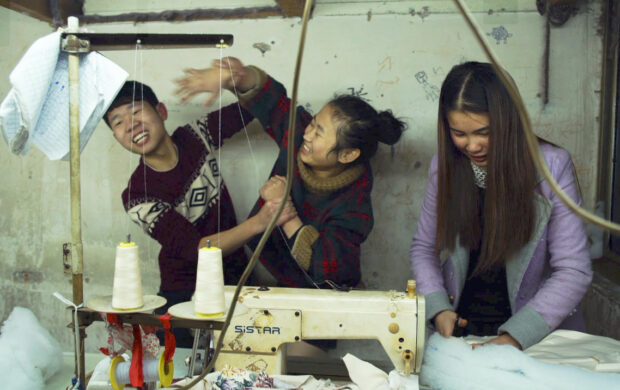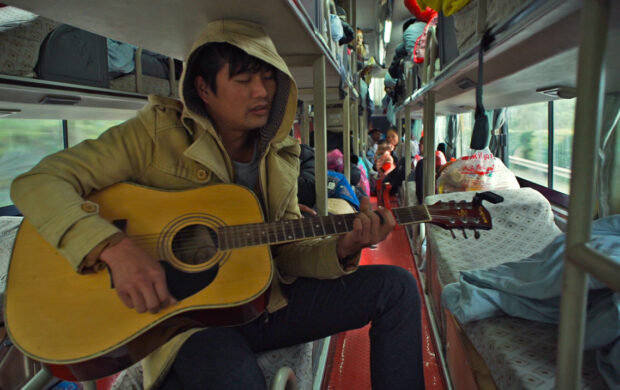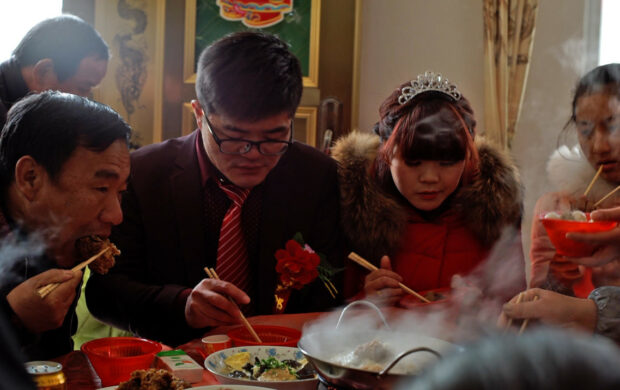
Wang Bing: "Made in China"
Lire la suiteThe film was presented in three parts last year, first in competition at Cannes (Spring), then at Locarno (Hard Times) and Venice (Homecoming) and it’s easy, when you watch the film in its entirety, to see why he chose to stick with this subject. For almost ten hours – four fewer than Crude Oil (2008), but one hundred minutes longer than Dead Souls (2018) and forty minutes longer than West of the Rails (2003) – the film produces a staggering number of locations and characters. We enter a workshop, whose address appears on screen, followed by the names, ages and birthplace of a few workers who become the protagonists of a plot that builds and develops to its provisional conclusion, before new locations and narratives are introduced. The filmmaker has described this structure, composed of a series of 20-minute segments, as “modular”, concerned as much with the integrity of each story as with their equal weight within the film’s sprawling tapestry. On the surface, life flows naturally. It would be easy to become hypnotised by these young people’s back-breaking labour, and to lend only a distracted ear to what is at stake for them. Sustained attention reveals the richness of a particularly compact narrative, in which the condition of all individuals is expressed through the hardships they face. In the words of Farocki, direct cinema is also a narrative genre.
Of all the episodes, Spring coincides best with the desire, expressed by the filmmaker at the outset of the project, to observe youth in urban centres. We meet teenagers and young adults who play, fight, flirt, unite with and repel one other; thoughtful boys and others like Xiao Wei whose mother ends up taking the rap for his bad behaviour; girls who try to chase off their suitors, and others who use the pretext of trading iPhones to go on dates. Each of them faces dilemmas that convey the insoluble contradictions of the system. At the very beginning of Spring, for example, the question of Shengnan’s pregnancy hangs on the decision of those around her. While her boss urges her parents to let her finish off her quota of clothing, her parents worry about which side of the family the father of the baby will choose. Getting married means that one of the two parties will lose their residency permit, and losing a child also means losing a chunk of household income. Over time, these individual stories accumulate, and group drama comes to the fore. When Chen Qingtao first appears, his composure is instantly noticeable, and everyone seems to see in him the qualities of a negotiator. As the holidays approach, he leads a whole workshop down to the first floor to negotiate their rates per item with the boss; talks that are all the lengthier and more important because, in the absence of a contract, they determine everyone’s return home.
The second part takes up this same architecture, this time highlighting the dispersal of the forces we’ve seen converge. The pace at which the episodes unfold seems to accelerate, and the characters multiply exponentially. There are more quarrelsome, irresponsible or proud boys, whose desire to escape exploitation leads them to stay in bed or go out and play, at the risk of contracting debts or getting into trouble. Xu Wanxiang, for example, emerges from a night in police custody and sets out to recoup what he’s owed from the boss with whom he fought: but the loss of his wage book immediately condemns his demands, the repayment of his debt, and his future in Zhili. Then there’s Fu Yun, a newcomer who messes up a whole consignment of clothes because she hasn’t looked at the pattern carefully. The uncle she calls on to help her out of a jam pushes back when he realises the risk he’s taking; she ends up undoing the seams of the garments, a real Sisyphean task, which she will then redo at a loss.
Like Spring, Hard Times ends up telling the story of an entire workshop, who one day discover their boss beating up a supplier in the street before fleeing. When the fruits of their labour vanish, they are left with the option of paying themselves, unbeknownst to the Labour Office, by selling all the sewing machines to a loan shark. But the loan shark takes advantage of the situation, as does the owner of the premises, who cuts off the electricity that has already been paid for. And then the police try to get them to sign false declarations to make them take the blame. We see how responsibility always falls on the weakest and how, caught between different authorities, these young people continue to live in the cogs of a machine that crushes them, sometimes literally. Nevertheless, many of them return to Zhili, even when, as Si Wen recounts in a terrifying testimony, the slightest protest linked to a tax increase can put them at risk of imprisonment and torture.
In Homecoming, Wang Bing takes the opposite route to the one that led him to Zhili, this time taking a boat up the Yangtze River to follow the return of young workers to their native regions, first to the heights of Yunnan, then to the plains of Anhui province, for the wedding of one couple, and the New Year celebrations of others. By taking to the open sea, the film seems to loosen up a little, extending the nostalgia expressed in a sublime sequence in which two lovers sing to each other across voice notes. There’s a long train ride home, the end of the journey on steep country roads, a traditional wedding in the snow-capped mountains, then a much more prosaic wedding as we return, at the end of the holidays, nearer to urban centres.
Homecoming finally takes us back to Zhili, and to these workers as they choose their workshops and dormitories for the new season. Lin Shao, whom we met at the age of seventeen in a workshop where he worked with his girlfriend, Chen Wenting, is now twenty. His plight as a young father separated from a family that his work must support echoes the story of Shengnan’s abortion at the very beginning of the film. But after the methodical description of the living conditions of this workforce, we can now gauge the extent to which their lives are conditioned by this system, and the weight each of their decisions carries. The overall picture takes the time it needs to emerge: as with the workers, it’s at the end that you get your due.
This is how the narrative of direct cinema works: rather than imposing fictional elements onto reality, it stitches together a posteriori the pieces of a story that present themselves initially in a dispersed and fragmented way. The relative effort required to watch such a film is paid off a hundredfold, as rare as it is to witness such an eruption of narratives. The metaphor of spinning a story takes on a whole new dimension, and we are reminded of the terrifying oracle in Throne of Blood who sings while spinning a yarn: “the lives of men are as insignificant as those of insects”. And if we remember that at the heart of the retina are cone-shaped photoreceptors, essential for colour perception, we come to think that, with the cones of sewing machines constantly being unwound, the filmmaker has discovered in the workshops of Zhili a kind of film studio.
After documenting the end of the 20th-century factory at length, and recording the words of their survivors, Wang Bing has found in Zhili a place of immense vitality within which to continue documenting China’s future, while renewing his cinema from within. Of course, this vitality is neither simple nor unconditional. The industry this energy sustains rests on the cruelly ironic premise that young workers emerge from childhood to make clothes for children, but that they will only be able to have children at the cost of sacrificing their own existence. What kind of life is possible in a system that barely allows for one? We can see how economic forces exert control over life more insidiously but more effectively than the will of the State. Freedom, says Youth in an intractable statement, comes at this price.
Antoine Thirion
Antoine Thirion is a critic and programmer, and a member of the Cinéma du réel selection committee.


